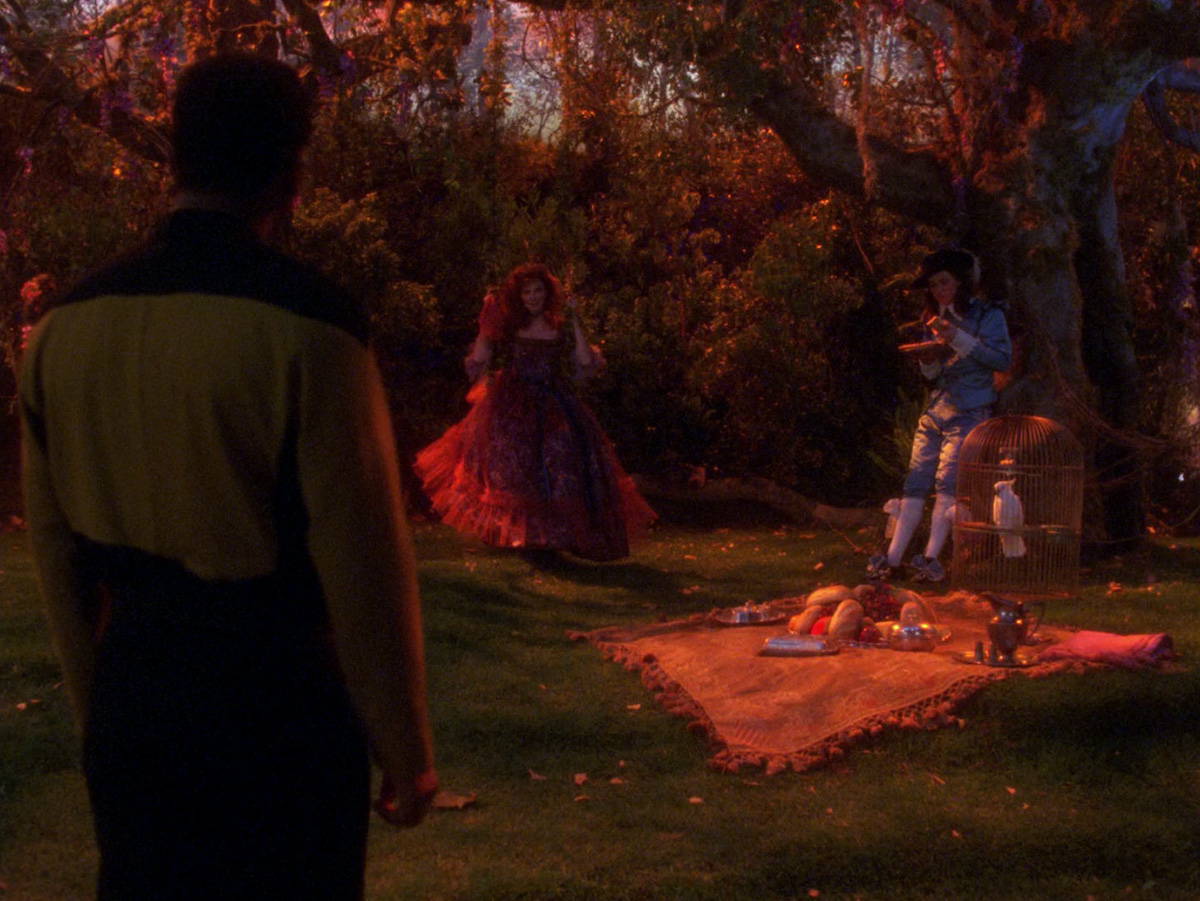“I am the goddess of empathy! Cast off your inhibitions and embrace love! Truth! Joy!”
“Hollow Pursuits” is one of those terrifying episodes of Star Trek: The Next Generation that was really good – and really smart – when it first aired, and actually became more so with age. Ostensibly written as a kind of knowing wink to the healthy fantasy lives of the average Trekkie in 1990, “Pursuits” has become a prescient essay on any average person’s myriad relationships with entities that are not, strictly speaking, “real” – be they video game characters, online pornography, or just the constructed personalities that we all put up on Facebook. It’s a crackerjack episode, and hasn’t aged a day. Particularly on blu-ray, “Hollow Pursuits” is a compellingly modern example of Star Trek done really well.
It all revolves around Dwight Schultz’s first appearance as Lt. Barclay. Barclay became a running gag on the show, sometimes used more successfully than others, but Schultz slams it clear out of the park in his inaugural performance. There’s real pathos in his portrayal of the meek guy who just can’t fit in on the ship of Starfleet’s best and brightest. I think we all see a bit of ourselves in Reg, because realistically, he’s the guy on the Enterprise that most of us would probably be.
But beyond his natural human foibles, there’s a good argument as “Hollow Pursuits” unfolds that Barclay is suffering from a crippling social anxiety disorder, describing himself as being in a state of fear pretty much all the time. (“He orders warm milk,” Guinan tells Geordi of Barclay’s solo visits to Ten-Forward, another lovely, and painfully sad, image of a person out of place with himself.) Barclay talks of being afraid all the time of forgetting names or not knowing what to do with his hands, or pre-writing things to say when he has to go to a party. Hey: I’ve been there, at least in spirit. If Barclay didn’t emerge from “Hollow Pursuits” with some genuine friends aboard the Enterprise – particularly Geordi, Data and Troi – I don’t think I’d have been able to handle the continuing thought of his loneliness.
And then there’s the holodeck stuff, which is just marvelous. The episode raises, and unfortunately drops, the notion that Barclay has been using the holographic Troi as a kind of sex surrogate – Star Trek skirting around that issue once again, only this time fully implicating a principal character! The extensive Three Musketeers sequences, though, are ribald fun, with Picard, Geordi and Data hamming it up with their fencing foils, Troi pontificating wetly on the empathic virtues of truth, love, and joy, and a miniaturized Riker waxing philosophical about Barclay’s skill with a sword.
When “Hollow Pursuits” was written, we all thought “Virtual Reality” – of the type for which the holodeck represents the ne plus ultra – was in store for us in the immediate future. This didn’t prove out, of course, or at least not in fantasy environments which are as clearly demarcated as “now you’re in the holodeck; now you’re not.” Instead, fantasy and identity fucked for about twenty years and had a bajillion creepy social media babies, and if this generation is having understandable growing pains handling it, the next few decades’ worth of children are going to be some really strange dudes.
I admire one notion from the episode’s setup quite a bit, when Picard is first informed of the problems Geordi is having with Barclay. The captain admonishes his crew that it’s too easy to transfer Barclay to another ship and make him, thereby, someone else’s problem. That’s a casual, accessible model of good leadership and practical responsibility, and if it’s just one note in the episode as a whole, it’s left a lasting impression on me.
Four and a half enthusiastic Enterprises out of five.

Blogging The Next Generation runs every Tuesday as I work my way through every episode of Star Trek: The Next Generation on blu-ray. Season Four is in stores today.
